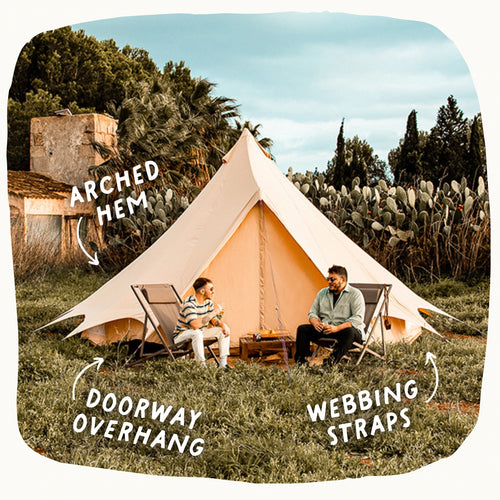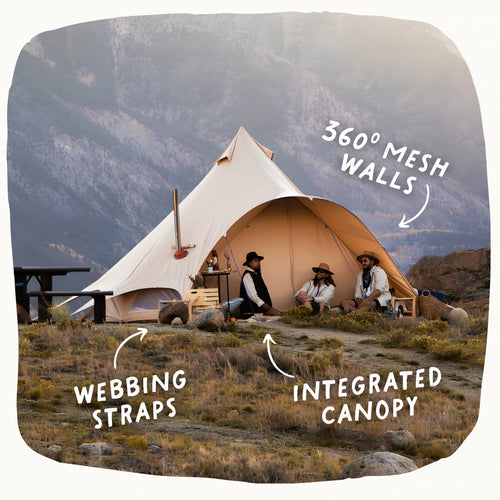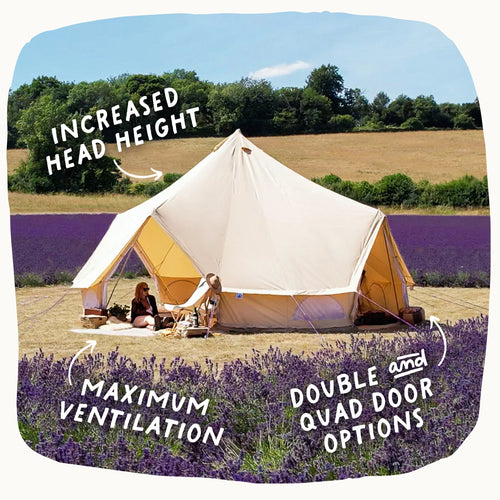Tackling anxiety: One step, hike, and pitch at a time!

Mental Health Awareness Week commences on Monday 15th - Sunday 21st May and this year the organisations official theme highlights anxiety.

As outdoor enthusiasts we really do live and breathe the benefits of camping, especially the positive effects it can have on our minds, our confidence, feelings of self achievement, and so much more.
We have highlighted several verbs that we want you to take with you on your next adventure, whether that's camping or simply just taking a solo walk...

Once you get comfortable with the beginners steps, then you can look to utilising the infinite space and newly found 'you-time' with longer-term escapades like camping trips & adventure fuelled hikes.
If you're ready to take you AND your glamping gear outdoors, check out Hipcamp for amazing places to pitch your tent and temporarily call home!
-
Reduces stress and anxiety: Breathing exercises can activate the relaxation response, which helps to reduce the body's stress response and calm the mind. This can lead to decreased levels of anxiety and improved mood.
-
Improves focus and concentration: Focused breathing can help to increase mindfulness and improve concentration and focus. This can be helpful in reducing distractibility and improving cognitive performance.
-
Increases energy and vitality: Certain types of breathing exercises can help to increase oxygen flow to the body and brain, which can lead to increased energy levels and a greater sense of vitality.
-
Enhances immune function: Deep breathing can help to increase blood flow and oxygenation throughout the body, which can support the immune system and improve overall health.
-
Improves cardiovascular function: Breathing exercises can help to reduce blood pressure and improve heart rate variability, which can lead to better cardiovascular health.

To feel is to effectively acknowledge your surroundings and tune in to all 5 senses; physically, spiritually, mentally & emotionally.
-
Sight: Take in the sights of nature around you, such as the colours of the sky, plants, and flowers, the shapes of the trees and rocks, and the movement of animals and insects. Look for beauty in the natural world, whether it's a stunning sunset, a vibrant wildflower, or the intricate patterns of a butterfly's wings.
-
Sound: Listen to the sounds of nature, such as the rustling of leaves, the chirping of birds, or the sound of flowing water. Try to focus on the sounds of nature around you, rather than any man-made sounds, and let them soothe and calm your mind.
-
Touch: Engage with nature through touch, such as feeling the texture of tree bark, the softness of moss, or the coolness of a stream. Take off your shoes and feel the grass or sand between your toes, or wrap yourself in a cozy blanket and feel the warmth of the sun on your skin.
-
Smell: Inhale the fragrances of nature, such as the scent of fresh flowers, the earthy smell of the forest, or the salty air of the ocean. Take deep breaths and let the scents calm and energise your mind.
-
Taste: Enjoy the tastes of nature, such as picking wild berries or herbs and savouring their flavours. Take a picnic or snack in the outdoors and enjoy the fresh air and surroundings while you eat.

laughter can be a powerful tool for improving mental health and managing anxiety. By providing a natural and enjoyable way to reduce stress and promote positive emotions, it can contribute to a greater sense of wellbeing and resilience.
Here are some ways we can get you laughing more, in the great outdoors...
- Practice laughter yoga: Laughter yoga is a type of yoga that combines breathing exercises and laughter to promote a positive mood and reduce stress.
- Read funny books or comics: Reading humorous books, comics or jokes can be a fun and easy way to incorporate more laughter into daily life.
- Play with pets or children: Playing with pets or children can often result in silly or humorous situations that can induce laughter.
- Spend time with funny people: Spending time with friends or family members who have a good sense of humor can be a great way to naturally increase laughter.
- Take a projector and screen on your next camping trip & watch a funny movie or comedy sketch under the stars: this can be a great way to induce laughter and promote a positive mood.

-
Reduces stress and anxiety: Practicing yoga and stretching outdoors can provide a calming and relaxing environment that can help to reduce stress and anxiety levels. Being in nature has also been shown to have a positive effect on mood and overall wellbeing.
-
Enhances physical health: Stretching and practicing yoga can help to improve flexibility, strength, and balance, which can contribute to better overall physical health. Being outdoors can also provide additional benefits, such as increased vitamin D from exposure to sunlight.
-
Improves mental clarity and focus: Practicing yoga and stretching outdoors can help to clear the mind and improve focus and mental clarity. Being in nature can also help to reduce mental fatigue and enhance cognitive function.
-
Increases self-awareness and mindfulness: Practicing yoga and stretching in nature can provide a sense of connection to the natural world and promote a greater sense of mindfulness and self-awareness.
-
Enhances relaxation and sleep quality: Practicing yoga and stretching outdoors can help to promote relaxation and improve sleep quality. The combination of physical activity, fresh air, and connection to nature can help to promote a more restful and rejuvenating sleep.

-
Reduces stress and anxiety: Dancing outdoors can be a fun and enjoyable way to release stress and tension, and can help to decrease anxiety levels. Additionally, being in nature has been shown to have a calming effect on the mind and body.
-
Boosts mood: Engaging in physical activity like dancing can trigger the release of endorphins, which are natural mood-boosters. Dancing outdoors can also provide a change of scenery and fresh air, which can contribute to a more positive mindset.
-
Enhances social connection: Dancing in a group or with a partner can promote social connection and a sense of belonging, which can be beneficial for mental health. Being outdoors can also provide opportunities to meet new people and build relationships.
-
Improves body image and self-esteem: Dancing can help improve body image and self-esteem by promoting a positive relationship with the body and fostering a sense of self-expression and confidence. Being in nature can also provide a sense of grounding and connection to the body.

Singing in nature can be a powerful tool for promoting mental health and wellbeing, fostering a deeper connection with the natural world, and creating a sense of joy and community. Here's three reasons why...
-
Stress reduction: Singing in nature can help to reduce stress and promote relaxation. Singing has been shown to lower levels of the stress hormone cortisol, and being in nature has also been found to reduce stress and anxiety.
-
Improved mood: Singing has been shown to increase levels of endorphins, the body's natural feel-good chemicals. Singing in nature can also enhance the mood-boosting effects of being in the great outdoors, creating a sense of joy and happiness.
-
Connection with nature: Singing in nature can help to foster a deeper connection with the natural world. Being surrounded by trees, plants, and animals can create a sense of peace and calm, and singing can help to amplify this connection.

We've all heard of the somwehat cliche saying 'Live, Love, Laugh', lots of people even have the quote plastered around their homes, but reading it and practising it are two different things.
Living in the moment, also known as mindfulness, can have several benefits for mental health and wellbeing. Here are some ways you can practice living in the moment:
- Focus on your breathing.
- Engage your senses.
- Practice gratitude.
- Let go of distractions.
- practice mindfulness meditation.
















Leave a comment